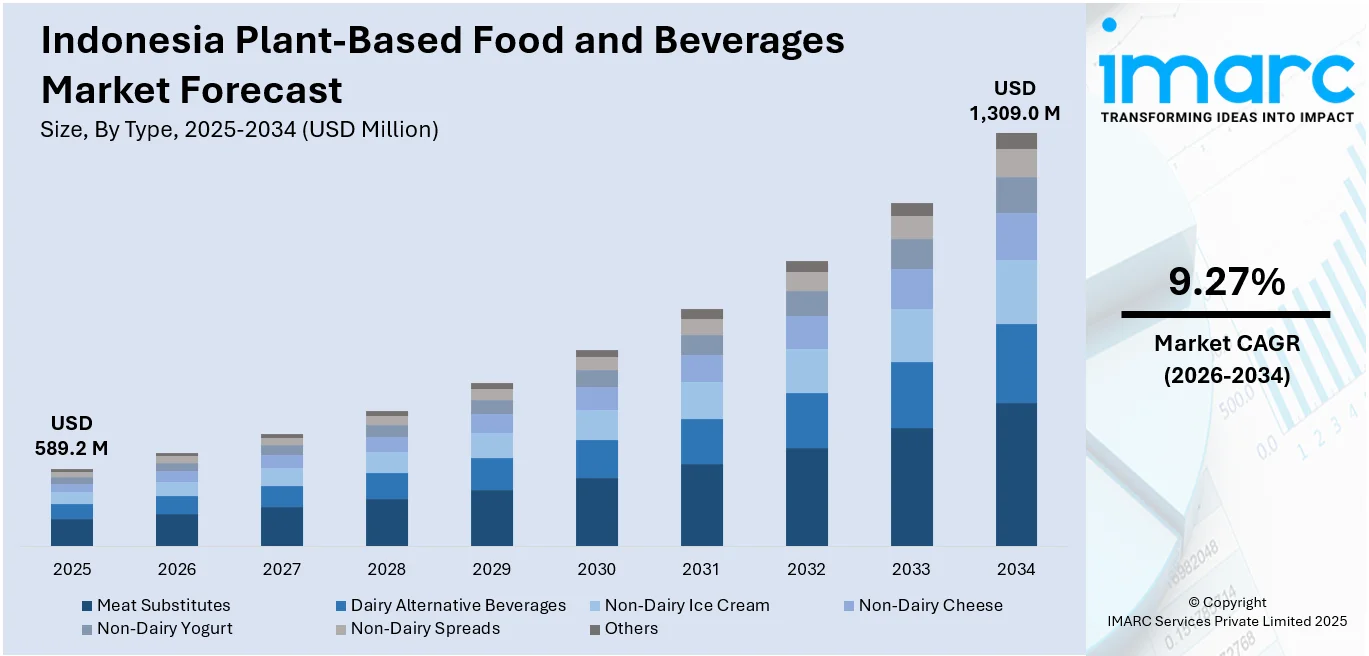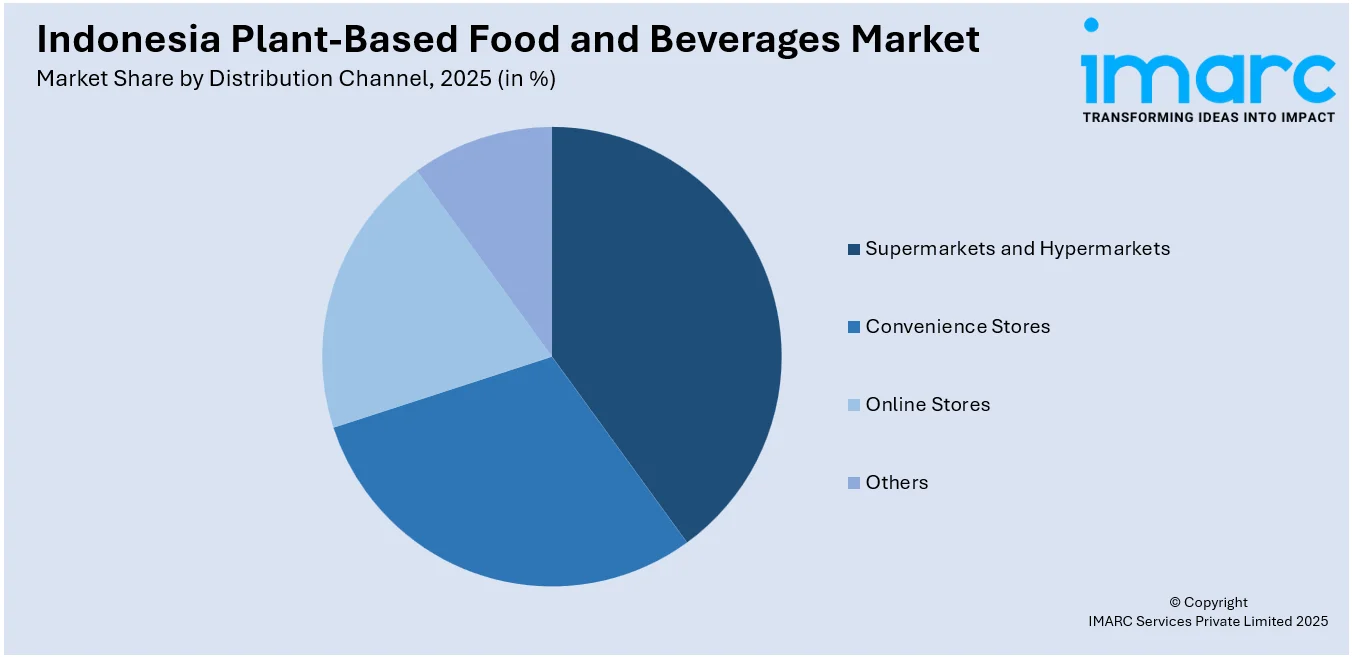
Indonesia Plant-Based Food and Beverages Market Size, Share, Trends and Forecast by Type, Distribution Channel, and Region, 2026-2034
Market Overview:
Indonesia plant-based food and beverages market size reached USD 589.2 Million in 2025. Looking forward, IMARC Group expects the market to reach USD 1,309.0 Million by 2034, exhibiting a growth rate (CAGR) of 9.27% during 2026-2034. The growing health and wellness trends, increasing environmental concerns, rising ethical considerations, significant innovative product development, favorable government support, and rising income levels across the region represent some of the key factors driving the market.
|
Report Attribute
|
Key Statistics
|
|---|---|
|
Base Year
|
2025 |
|
Forecast Years
|
2026-2034
|
|
Historical Years
|
2020-2025
|
| Market Size in 2025 | USD 589.2 Million |
| Market Forecast in 2034 | USD 1,309.0 Million |
| Market Growth Rate (2026-2034) | 9.27% |
Plant-based foods and beverages are products derived primarily from plant sources, such as vegetables, fruits, grains, nuts, seeds, and legumes, with little or no inclusion of animal-based ingredients. They have gained significant popularity in recent years due to their numerous health and environmental benefits. Plant-based diets are known for their lower saturated fat content, reduced cholesterol levels, and potential for weight management. Moreover, they are often rich in essential nutrients, including fiber, vitamins, and antioxidants, which can contribute to overall well-being. Plant-based beverages encompass a wide range of options, including almond milk, soy milk, oat milk, and coconut milk, which serve as alternatives to traditional dairy products. These beverages are often fortified with vitamins and minerals to provide a nutritionally comparable option to cow's milk.

To get more information on this market Request Sample
Indonesia Plant-Based Food and Beverages Market Trends:
A growing awareness about the health benefits associated with plant-based diets has led many Indonesians to adopt these dietary choices. Plant-based foods are often lower in saturated fats and cholesterol, making them appealing to individuals seeking to improve their overall health and reduce the risk of chronic diseases. Additionally, concerns about animal welfare have encouraged individuals to shift toward plant-based diets. Consumers are increasingly choosing plant-based foods and beverages as a way to avoid supporting industries that raise animals in objectionable conditions. Other than this, in Indonesia, where diverse cultures and religions coexist, many traditional dishes are already plant-based. This cultural acceptance of plant-based options contributes to the growth of the market. Besides this, as the Indonesian middle class expands, more consumers have the disposable income to explore and embrace premium plant-based products, which can be perceived as healthier and more ethical choices. In line with this, the Indonesian government has taken steps to promote sustainable agriculture and reduce the environmental impact of the food industry. These initiatives align with the growth of the plant-based food sector. Furthermore, food companies in Indonesia are investing in research and development to create innovative plant-based alternatives that closely mimic the taste and texture of meat and dairy products. This has expanded the variety of options available to consumers and made plant-based foods more appealing. Apart from this, rapid urbanization and busy lifestyles have led to an increased demand for convenient, ready-to-eat plant-based products. Furthermore, quick-service restaurants, food delivery services, and pre-packaged plant-based meals are becoming more accessible in urban areas, catering to the needs of modern consumers. Moreover, the expanding wellness and fitness industry in Indonesia has led to a heightened interest in nutrition and healthier eating habits. Plant-based foods are often associated with fitness and wellness, attracting consumers looking for nutritious alternatives to support their active lifestyles.
Indonesia Plant-Based Food and Beverages Market Segmentation:
IMARC Group provides an analysis of the key trends in each segment of the market, along with forecasts at the country level for 2026-2034. Our report has categorized the market based on type and distribution channel.
Type Insights:
- Meat Substitutes
- Tofu
- Tempeh
- Others
- Dairy Alternative Beverages
- Soy Milk
- Almond Milk
- Others
- Non-Dairy Ice Cream
- Non-Dairy Cheese
- Non-Dairy Yogurt
- Non-Dairy Spreads
- Others
The report has provided a detailed breakup and analysis of the market based on the type. This includes meat substitutes (tofu, tempeh, and others), dairy alternative beverages (soy milk, almond milk, and others), non-dairy ice cream, non-dairy cheese, non-dairy yogurt, non-dairy spreads, and others.
Distribution Channel Insights:

Access the comprehensive market breakdown Request Sample
- Supermarkets and Hypermarkets
- Convenience Stores
- Online Stores
- Others
A detailed breakup and analysis of the market based on the distribution channel have also been provided in the report. This includes supermarkets and hypermarkets, convenience stores, online stores, and others.
Regional Insights:
- Java
- Sumatra
- Kalimantan
- Sulawesi
- Others
The report has also provided a comprehensive analysis of all the major regional markets, which include Java, Sumatra, Kalimantan, Sulawesi, and others.
Competitive Landscape:
The market research report has also provided a comprehensive analysis of the competitive landscape in the market. Competitive analysis such as market structure, key player positioning, top winning strategies, competitive dashboard, and company evaluation quadrant has been covered in the report. Also, detailed profiles of all major companies have been provided.
Indonesia Plant-Based Food and Beverages Market Report Coverage:
| Report Features | Details |
|---|---|
| Base Year of the Analysis | 2025 |
| Historical Period | 2020-2025 |
| Forecast Period | 2026-2034 |
| Units | Million USD |
| Scope of the Report | Exploration of Historical and Forecast Trends, Industry Catalysts and Challenges, Segment-Wise Historical and Predictive Market Assessment:
|
| Types Covered |
|
| Distribution Channels Covered | Supermarkets and Hypermarkets, Convenience Stores, Online Stores, Others |
| Regions Covered | Java, Sumatra, Kalimantan, Sulawesi, Others |
| Customization Scope | 10% Free Customization |
| Post-Sale Analyst Support | 10-12 Weeks |
| Delivery Format | PDF and Excel through Email (We can also provide the editable version of the report in PPT/Word format on special request) |
Key Benefits for Stakeholders:
- IMARC’s industry report offers a comprehensive quantitative analysis of various market segments, historical and current market trends, market forecasts, and dynamics of the Indonesia plant-based food and beverages market from 2020-2034.
- The research report provides the latest information on the market drivers, challenges, and opportunities in the Indonesia plant-based food and beverages market.
- Porter's five forces analysis assist stakeholders in assessing the impact of new entrants, competitive rivalry, supplier power, buyer power, and the threat of substitution. It helps stakeholders to analyze the level of competition within the Indonesia plant-based food and beverages industry and its attractiveness.
- Competitive landscape allows stakeholders to understand their competitive environment and provides an insight into the current positions of key players in the market.
Key Questions Answered in This Report
The plant-based food and beverages market in Indonesia was valued at USD 589.2 Million in 2025.
The Indonesia plant-based food and beverages market is projected to exhibit a CAGR of 9.27% during 2026-2034, reaching a value of USD 1,309.0 Million by 2034.
The Indonesia plant-based food and beverages market is expanding owing to the growing health consciousness, rising demand for sustainable and ethical consumption, and increasing awareness about the environmental impact of animal-based products. Additionally, shifting dietary preferences, especially among younger populations, and a greater focus on plant-based protein sources contribute to the market growth.
Need more help?
- Speak to our experienced analysts for insights on the current market scenarios.
- Include additional segments and countries to customize the report as per your requirement.
- Gain an unparalleled competitive advantage in your domain by understanding how to utilize the report and positively impacting your operations and revenue.
- For further assistance, please connect with our analysts.
 Request Customization
Request Customization
 Speak to an Analyst
Speak to an Analyst
 Request Brochure
Request Brochure
 Inquire Before Buying
Inquire Before Buying




.webp)




.webp)












